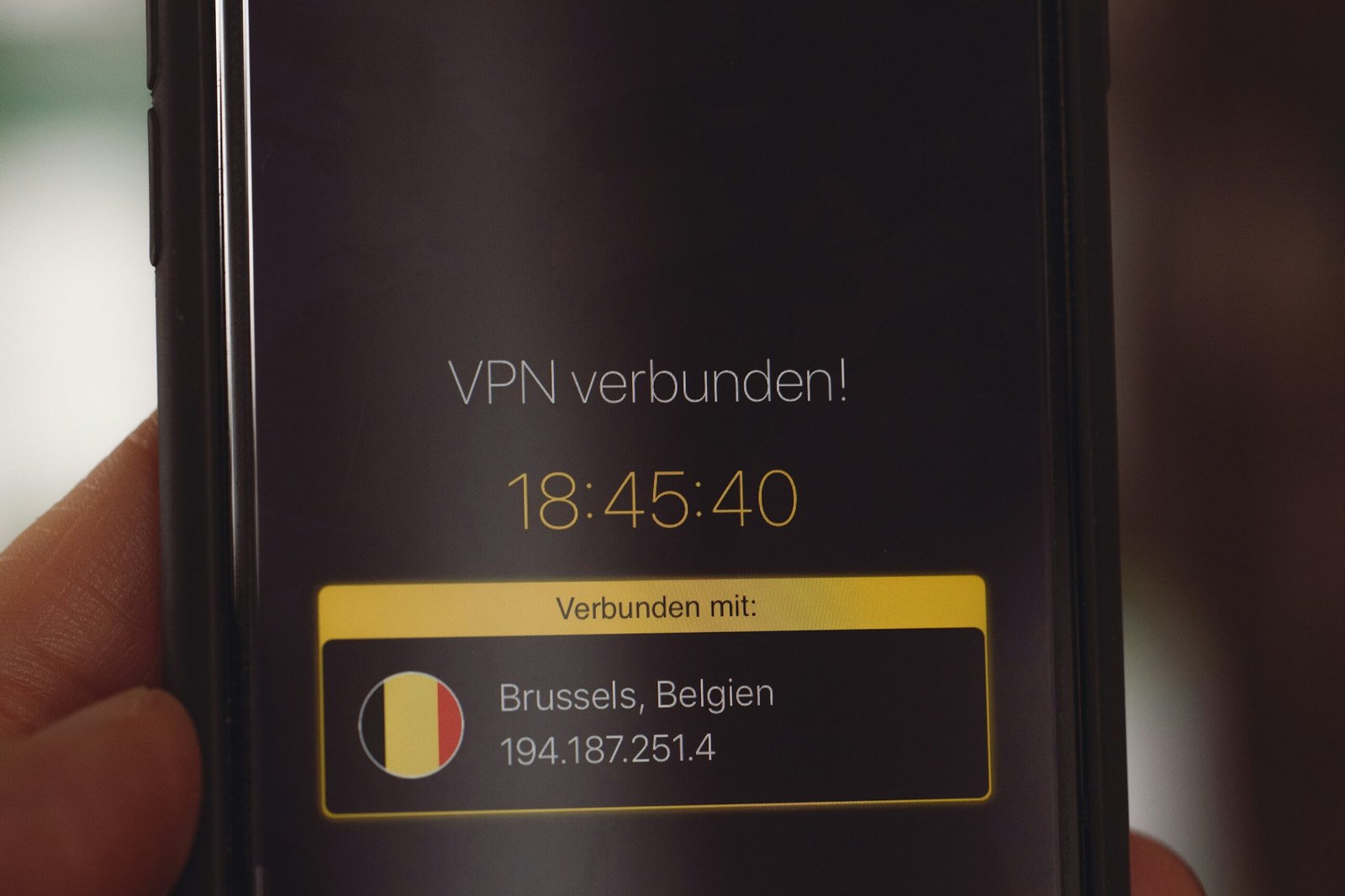Technology
Understanding VPNs: Their Benefits, Drawbacks, and How to Protect Your IP Address

What is a VPN?
A Virtual Private Network (VPN) is a technology that creates a secure, encrypted connection over a less secure network, such as the Internet. This technology serves multiple purposes, the primary one being the enhancement of security and privacy when users browse the web. A VPN allows individuals to send and receive data across shared or public networks as if they were directly connected to a private network. This function is particularly valuable for those looking to hide their location, surf the web anonymously, or protect sensitive information from potential threats.
At its core, a VPN works by routing your internet traffic through a remote server operated by a VPN provider. This effectively masks your real IP address with one of the provider’s IP addresses—an important feature for enhancing internet privacy. The data transmitted between your device and the VPN server is encrypted, which means that even if someone were to intercept the data, they would be unable to decipher it. This encryption process safeguards your sensitive information, such as passwords and financial data, from cybercriminals and hackers.
Basic components of a VPN service include the VPN client (software installed on your device), the VPN server (where your data is routed), and the protocols used for establishing the secure connection (such as OpenVPN, L2TP, or IKEv2). Each of these elements plays a crucial role in ensuring robust network security and private browsing capabilities. By utilizing a VPN, users can significantly improve their data security and privacy online. This technology not only makes it harder for third parties to track online activities but also allows access to geo-restricted content, providing a more versatile browsing experience.
How Does a VPN Work?
A Virtual Private Network (VPN) operates by creating a secure connection between a user’s device and a remote server owned by the VPN service provider. When a user activates a VPN, their internet traffic is routed through this secure server, thereby masking their actual IP address. This server assignment allows users to appear as if they are browsing from a different location, effectively enabling them to hide their actual geographic location while they are online.
The process begins with establishing a secure connection, often referred to as a VPN tunnel, which encrypts the data transmitted between the user’s device and the VPN server. This encryption process is crucial for maintaining internet privacy and securing sensitive information from potential eavesdroppers. By utilizing various encryption protocols such as OpenVPN, IKEv2, or L2TP, VPNs ensure that the data exchanged is indecipherable to any unauthorized entities, further enhancing network security.
Once the tunnel is established and data is encrypted, the user’s original IP address is replaced with the server’s IP address. This not only provides a degree of anonymity but also makes it more challenging for websites and services to track the user’s online activities. Additionally, the new IP location assigned by the VPN server allows users to access content that may be region-restricted based on geographic IP addresses.
Moreover, VPNs incorporate protocols that govern how data is transmitted, including the type of encryption used. More advanced protocols provide faster connection speeds, better security features, and the ability to bypass sophisticated firewalls. Thus, VPNs play an essential role in enhancing a user’s experience by providing both security and privacy in online browsing.
Benefits of Using a VPN
Using a VPN, or Virtual Private Network, offers numerous advantages that significantly enhance online security and privacy. Foremost among these benefits is the enhanced protection of personal data. A VPN encrypts your internet connection, making it difficult for third parties, such as hackers or cybercriminals, to access sensitive information. This encryption is crucial when using public Wi-Fi networks, which are often vulnerable to interception. By routing your online activities through a secure server, a VPN effectively safeguards your data from potential threats.
Privacy remains a primary concern for internet users today. With a VPN, individuals can hide their true IP address, replacing it with one from the VPN provider, thus masking their IP location. This process prevents websites and marketers from tracking browsing habits and personal information. The ability to maintain private browsing habits is essential in an era where online tracking is pervasive, allowing for greater control over one’s internet privacy.
Additionally, VPNs enable users to bypass geo-restrictions that may limit access to specific content based on location. Many streaming services and websites impose geographic barriers, preventing users from accessing desired media. By connecting to a server in a different country, users can navigate around these limitations and enjoy a more expansive range of content. This aspect is particularly valuable for travelers and expatriates who wish to maintain access to their home country’s online services.
Moreover, a VPN reduces online tracking by various entities, enhancing users’ overall experience. Many websites employ tracking technologies to monitor user behavior, which can compromise personal privacy. The anonymity provided by a VPN contributes to a more secure browsing environment. Overall, the advantages of using a VPN are manifold, making it an essential tool for anyone seeking to ensure robust security, privacy protection, and unrestricted internet access.
Potential Drawbacks of VPN Usage
While Virtual Private Networks (VPNs) offer a multitude of benefits for enhancing internet privacy and security, they are not without their drawbacks. One significant concern is the potential reduction in internet speed. Due to the encryption process, routing traffic through a VPN server can lead to slower connection speeds, limiting the user experience, especially when streaming videos or engaging in activities requiring high bandwidth.
Another point to consider is the necessity for a reliable internet connection. If the connection is unstable, using a VPN may exacerbate connectivity issues, leading to more frequent disconnections and interruptions in service. This concern is particularly relevant for users in areas with less robust internet infrastructure.
Legal implications also arise as the use and regulation of VPNs can vary greatly depending on the region. In some countries, VPN usage may be restricted or even illegal, resulting in potential legal ramifications for users who fail to comply with local laws. It is prudent for users to familiarize themselves with the regulations regarding VPNs in their respective jurisdictions to avoid unintentional violations that could lead to fines or legal action.
Finally, the trustworthiness of VPN providers is an essential factor that users must consider. While many VPN services emphasize privacy and security, some may collect user data or employ dubious practices that could undermine the very privacy users seek to achieve. It is vital to conduct thorough research and select a reputable provider, ensuring that their logging policies align with the user’s desire for anonymity and security online.
Overall, it is important to weigh these potential drawbacks against the advantages before deciding to implement a VPN solution in pursuit of improved internet privacy and security.
When Should You Use a VPN?
Utilizing a VPN serves numerous purposes, significantly enhancing your internet privacy and network security. One of the most common scenarios for using a VPN is when accessing region-locked content. Streaming platforms often restrict certain shows and movies based on geographical locations. By masking your IP address with a VPN, you can effectively hide your location and bypass such restrictions, allowing you to enjoy a broader array of entertainment options.
Another situation where a VPN proves beneficial is during remote work. Employees accessing their company networks or sensitive information from locations outside of the office can put their data at risk. A VPN encrypts internet traffic, ensuring that transmitted data remains secure from potential threats. This is especially vital for individuals utilizing public Wi-Fi networks, which are notoriously insecure. By adopting private browsing methods through a VPN, you can maintain the confidentiality of your company’s sensitive information.
Additionally, a VPN is essential for ensuring internet privacy during online transactions. When performing online banking or shopping, protecting your financial data becomes paramount. A VPN provides an additional layer of security by encrypting your connection, making it much more challenging for cybercriminals to intercept your sensitive information. By using such a service, you not only protect your IP address but also preserve your overall online anonymity.
Ultimately, understanding the various scenarios where a VPN is advantageous equips you to make informed decisions regarding your internet usage. Whether you’re streaming content, working remotely, or transacting online, using a VPN can significantly improve your security and safeguard your internet privacy.
Best Practices for Using a VPN
When utilizing a VPN (Virtual Private Network) for enhanced internet privacy and security, it is crucial to follow specific best practices to maximize its effectiveness. One of the foremost steps is selecting a reliable VPN provider. Prioritize services that have a proven track record of safeguarding user data and maintaining robust privacy policies. Look for providers that offer advanced features such as no-logs policies, strong encryption standards, and a user-friendly interface.
Understanding the terms of service is equally important when choosing a VPN. This document outlines the rights and responsibilities both you and the provider hold. Pay close attention to clauses surrounding data retention, logging practices, and user privacy. Being informed allows you to select a VPN that is aligned with your personal privacy goals, ensuring that your activity remains private while using the service.
It is essential to consider the limitations that often accompany free VPNs. While they may present an appealing option, free services frequently introduce significant drawbacks, including data leaks, slow connection speeds, and potential monetization of user data through ad placements. Choosing a reputable paid VPN can provide more reliable network security and a better overall experience with private browsing capabilities.
Finally, ensure correct setup and connectivity of your VPN. This includes configuring the software according to the provider’s guidelines and ensuring you are connected before engaging in activities that require an IP address mask or location hiding. Regularly test your connection for leaks to confirm that your original IP location remains hidden while you browse. By keeping these best practices in mind, you can significantly enhance your effectiveness when using a VPN, ultimately ensuring a more secure and private internet experience.
Understanding IP Address Exposure
Your IP address, or Internet Protocol address, serves as a unique identifier for your device on the internet. Much like a physical address, it contains critical information about your internet connection, making it possible for websites, applications, and online services to send data to your device. However, this essential aspect of your digital presence can lead to severe privacy issues when exposed. A visible IP address can be tracked and traced back to your specific location, revealing valuable data that could jeopardize your internet privacy.
When your IP address is publicly accessible, it can be exploited by malicious entities. Hackers can use it to identify your geographical location, allowing them to target you with tailored attacks or track your online movements. Furthermore, internet service providers (ISPs) may log your online activities, which can be accessed by authorities or marketers, leading to a potential breach of your privacy. This tracking can extend beyond simple visits to websites; it can also include your online transactions, communications, and even your browsing history.
The consequences of having your IP address exposed can be significant. Potential risks include targeted ads based on your browsing habits, harassment or stalking incidents, and susceptibility to online fraud or theft. In addition, if your real IP address is revealed while conducting sensitive activities, such as online banking or private browsing, it opens avenues for unauthorized access to your accounts and sensitive information.
Given the importance of internet privacy, it is crucial to implement measures to hide your location and protect your IP address. VPN services offer a solution by masking your IP address, thereby enhancing your network security. By utilizing a reliable VPN, you can achieve private browsing, ensuring that your online activities remain confidential and shielded from prying eyes.
How to Prevent IP Exposure
Preventing IP exposure is crucial for maintaining internet privacy and enhancing network security. One of the most effective methods is using a Virtual Private Network (VPN). A VPN creates a secure tunnel between your device and the internet, encrypting your data and masking your IP address. This means that while you browse online, your actual location remains hidden, significantly reducing the risk of unauthorized tracking and data breaches.
Another option is employing proxies, which serve as intermediaries between your device and the internet. They can obfuscate your IP address and help maintain a degree of privacy. However, it is essential to choose reputable proxies, as some may log your data or compromise your security. For even higher levels of anonymity, consider using tools like Tor. The Tor network disperses your internet traffic across multiple nodes, further concealing your IP location and making it exceedingly difficult to trace your online activities back to you.
In addition to utilizing these tools, adopting good cybersecurity practices is paramount. Regularly updating your software ensures that you have the latest security features and protections against vulnerabilities. Using secure connections, such as HTTPS, adds an additional layer of encryption when transmitting data, offering better protection against potential eavesdroppers.
Furthermore, always be cautious when accessing public Wi-Fi networks, as they often lack adequate security measures and can expose your IP address and personal information. When connecting to such networks, using a VPN becomes even more critical. By integrating these technologies and practices into your browsing habits, you can significantly enhance your internet privacy and safeguard your IP address from exposure.
Conclusion: Weighing the Pros and Cons of VPNs
As we have explored the various facets of Virtual Private Networks (VPNs), it is evident that their use comes with both significant advantages and notable drawbacks. On one hand, VPNs play a crucial role in enhancing internet privacy by allowing users to hide their location and mask their IP address. This capability not only shields personal information from prying eyes but also enables private browsing, making online activities more secure. By encrypting network traffic, VPNs effectively bolster network security, safeguarding users from potential threats such as hacking and unauthorized access.
However, it is important to consider the limitations of VPNs. Not all services offer the same level of protection, and some may inadvertently compromise users’ security or privacy due to poor encryption practices or data logging policies. Additionally, relying solely on a VPN can create a false sense of security, leading individuals to neglect other necessary measures for maintaining internet safety. Performance issues, such as slower internet speeds and occasional connection drops, can also hinder the user experience, which is a crucial factor to consider, especially for streaming or gaming activities.
When deciding to implement a VPN in your online practices, it is essential to weigh these pros and cons carefully. Understanding your specific needs and evaluating different VPN providers will enable you to make informed choices. A thorough assessment of your internet usage patterns, alongside a consideration of the level of privacy you desire, will guide you in selecting a service that best aligns with your objectives. By taking proactive steps towards improving your internet security, including the potential adoption of a VPN, you can significantly enhance your online safety and safeguard your digital presence.

-

 Crypto7 years ago
Crypto7 years agoThese ’90s fashion trends are making a comeback in 2017
-

 Inside News7 years ago
Inside News7 years agoThe final 6 ‘Game of Thrones’ episodes might feel like a full season
-

 Crypto7 years ago
Crypto7 years agoAccording to Dior Couture, this taboo fashion accessory is back
-

 Inside News7 years ago
Inside News7 years agoThe old and New Edition cast comes together to perform
-

 Artificial Intelligence7 years ago
Artificial Intelligence7 years agoPhillies’ Aaron Altherr makes mind-boggling barehanded play
-

 Esports & Gaming7 years ago
Esports & Gaming7 years agoUber and Lyft are finally available in all of New York State
-

 Inside News7 years ago
Inside News7 years agoDisney’s live-action Aladdin finally finds its stars
-

 Artificial Intelligence7 years ago
Artificial Intelligence7 years agoSteph Curry finally got the contract he deserves from the Warriors



You must be logged in to post a comment Login